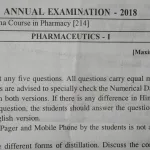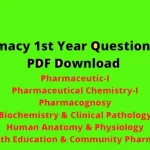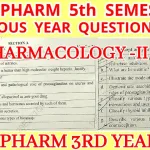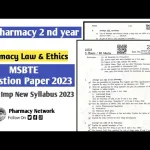1. What motivated you to pursue a career in the pharmaceutical industry?
I have always been passionate about healthcare and improving people’s lives. The pharmaceutical industry allows me to apply my knowledge and skills to make a difference in patient outcomes through innovative drug development and safe medicine production.
2. Can you explain the difference between pharmacokinetics and pharmacodynamics?
Pharmacokinetics is the study of how the body absorbs, distributes, metabolizes, and excretes a drug, while pharmacodynamics focuses on the effects of the drug on the body and how it achieves its therapeutic effect.
3. What is GMP (Good Manufacturing Practice)?
GMP is a system for ensuring products are consistently produced and controlled according to quality standards. It is designed to minimize the risks involved in pharmaceutical production that cannot be eliminated through testing the final product.
4. Can you define bioavailability and its importance?
Bioavailability is the proportion of a drug that enters the systemic circulation and reaches the target tissue, influencing its effectiveness. It is critical for determining the appropriate dosage and administration route.
5. What is the role of a Quality Assurance (QA) department in pharmaceuticals?
QA ensures that the pharmaceutical products meet the required quality standards throughout the manufacturing process, from raw material sourcing to the final product, by implementing SOPs, audits, and quality checks.
6. What are SOPs, and why are they important in the pharmaceutical industry?
Standard Operating Procedures (SOPs) are detailed, written instructions to achieve uniformity in the performance of a specific function. In pharmaceuticals, they ensure consistency, compliance, and safety across all processes.
7. Can you explain the process of drug discovery and development?
Drug discovery begins with identifying potential compounds, followed by preclinical testing. If successful, the drug moves to clinical trials (Phase I, II, III), and if proven safe and effective, it is submitted for regulatory approval before being marketed.
8. What is a clinical trial, and what are the phases involved?
Clinical trials are research studies that test how well new medical approaches work in people. Phases include: Phase I (safety and dosage), Phase II (efficacy and side effects), Phase III (confirmation of effectiveness, monitoring of side effects), and Phase IV (post-marketing surveillance).
9. What is the difference between a generic drug and a brand-name drug?
A brand-name drug is marketed under a trademarked name by the pharmaceutical company that developed it. A generic drug is chemically identical to the brand-name drug but is sold under its chemical name once the patent expires.
10. What is an NDA (New Drug Application)?
An NDA is a regulatory application submitted to the FDA that provides data from clinical trials to support the safety and effectiveness of a new drug. It is required for a drug to be marketed in the United States.
11. What is pharmacovigilance, and why is it important?
Pharmacovigilance is the process of monitoring, assessing, and preventing adverse effects of drugs. It is essential to ensure the ongoing safety of drugs after they have been released into the market.
12. How do you ensure compliance with regulatory requirements in pharmaceutical production?
By staying updated on the latest guidelines from regulatory bodies (like FDA, EMA), adhering to GMP and other standards, conducting internal audits, and maintaining thorough documentation at every stage of the manufacturing process.
13. What is validation in pharmaceutical manufacturing?
Validation is the documented process of proving that a system, process, or method consistently produces a product that meets predetermined specifications and quality attributes.
14. Can you explain the role of a Regulatory Affairs professional?
Regulatory Affairs professionals ensure that pharmaceutical companies comply with all the regulations and laws applicable to drug development and marketing. They also prepare submissions for new drug approvals and manage regulatory documents.
15. What is an API in pharmaceuticals?
An Active Pharmaceutical Ingredient (API) is the substance in a drug that is biologically active and responsible for its therapeutic effects.
16. Describe the role of excipients in drug formulation.
Excipients are inactive substances used in drug formulations to aid the processing of the drug and enhance stability, bioavailability, or patient acceptability.
17. How do you approach troubleshooting issues in the manufacturing process?
I begin by gathering data and identifying the root cause of the issue through a systematic analysis. I then apply solutions to resolve the problem and prevent recurrence, often revising SOPs or retraining staff if necessary.
18. What is the significance of stability testing in pharmaceuticals?
Stability testing determines how the quality of a drug varies with time under various environmental conditions (temperature, humidity, light). It helps establish a drug’s shelf life and appropriate storage conditions.
19. What are the common challenges faced in drug manufacturing?
Challenges include maintaining product quality and consistency, regulatory compliance, managing supply chain logistics, and controlling costs, especially when scaling up production.
20. What are the key components of a successful product launch in the pharmaceutical industry?
A successful product launch involves thorough market research, effective regulatory submissions, strategic marketing, training for sales teams, and ensuring supply chain readiness.
21. What is the role of a pharmacist in the healthcare system?
Pharmacists play a critical role in patient care by dispensing medications, providing drug information, ensuring the safe use of medications, and offering advice on drug interactions and side effects.
22. What are your strategies for managing the risks associated with pharmaceuticals?
My approach involves continuous monitoring for adverse effects, conducting risk assessments, implementing safety protocols, and maintaining thorough documentation to address potential risks before they escalate.
23. Can you explain the concept of a biopharmaceutical?
A biopharmaceutical is a drug derived from biological sources, such as proteins, DNA, or cells, as opposed to chemically synthesized drugs. These include vaccines, monoclonal antibodies, and gene therapies.
24. What is the significance of intellectual property (IP) in pharmaceuticals?
IP, particularly patents, is vital for protecting new drug discoveries and ensuring that companies have exclusive rights to market their innovations, allowing them to recoup R&D costs.
25. How do you stay current with trends and changes in the pharmaceutical industry?
I regularly attend industry conferences, read scientific journals, participate in webinars, and stay connected with professional networks and regulatory updates to remain informed about advancements and changes.
26. What is the difference between sterile and non-sterile manufacturing?
Sterile manufacturing involves producing products in a controlled, contaminant-free environment to ensure no microbial contamination, typically for injectable drugs. Non-sterile manufacturing doesn’t require such stringent control but still ensures high quality and safety.
27. What are the various dosage forms of pharmaceuticals?
Pharmaceuticals come in several forms, such as tablets, capsules, injectables, topical creams, gels, patches, inhalers, and liquid suspensions. The choice of dosage form depends on the drug’s properties and the intended therapeutic effect.
28. Can you describe the purpose of Phase IV clinical trials?
Phase IV clinical trials are conducted after a drug has been approved for marketing. They monitor the long-term effectiveness and safety of the drug in a broader patient population.
29. What is a placebo, and what role does it play in clinical trials?
A placebo is an inactive substance given to a group of participants in clinical trials. It serves as a control to help measure the true effect of the drug being tested by comparing the outcomes of the placebo group and the treated group.
30. What is HPLC, and why is it used in pharmaceuticals?
High-Performance Liquid Chromatography (HPLC) is a technique used to separate, identify, and quantify components in a mixture. It is commonly used in the pharmaceutical industry for quality control and analyzing drug purity.
31. Can you explain how drug-drug interactions occur?
Drug-drug interactions happen when one drug affects the action of another. This can occur through mechanisms like altering drug metabolism, increasing toxicity, or reducing efficacy. It’s critical to monitor potential interactions in polypharmacy.
32. How do you ensure safety in drug manufacturing?
Safety in drug manufacturing is ensured by adhering to GMP standards, implementing strict quality control measures, regularly training staff, and conducting frequent audits to identify and mitigate any risks.
33. What are the different types of tablets, and how do they work?
There are various types of tablets, including immediate-release, extended-release, chewable, sublingual, and enteric-coated tablets. Each works differently based on how they release the active ingredient into the body.
34. What is a black box warning?
A black box warning is the FDA’s strictest warning for prescription drugs that can cause serious adverse effects. It appears on the drug’s label to inform healthcare providers and patients of the risks.
35. Can you explain biopharmaceutical classification systems (BCS)?
BCS classifies drugs based on their solubility and permeability. It helps in understanding how well a drug will dissolve in the body and how efficiently it will be absorbed, aiding in formulation and development decisions.
36. What is the role of a formulation scientist?
A formulation scientist develops drug formulations by selecting appropriate excipients, ensuring drug stability, and optimizing delivery methods. Their work is crucial for ensuring the drug’s efficacy, stability, and patient compliance.
37. What are orphan drugs, and why are they important?
Orphan drugs are developed to treat rare diseases, affecting a small population. Despite the limited market, they are important as they offer treatment options for patients with conditions that would otherwise go unaddressed.
38. How do you handle strict deadlines in pharmaceutical projects?
I prioritize tasks based on urgency and importance, maintain clear communication with stakeholders, and use project management tools to track progress. This helps in staying on schedule while maintaining quality.
39. What is an IND (Investigational New Drug) application?
An IND application is submitted to the FDA before a new drug is tested in humans. It includes data from preclinical studies and outlines how clinical trials will be conducted.
40. Can you explain the importance of cold chain management in pharmaceuticals?
Cold chain management ensures temperature-sensitive drugs, such as vaccines, are stored and transported within required temperature ranges to maintain their efficacy and safety throughout the supply chain.
41. What is the difference between efficacy and potency?
Efficacy refers to the ability of a drug to produce the desired therapeutic effect, while potency is the amount of drug needed to produce that effect. A more potent drug requires a lower dose to achieve the same effect as a less potent one.
42. What are the critical factors to consider in API manufacturing?
Key factors include purity, stability, yield, regulatory compliance, environmental considerations, and process scalability to ensure the active ingredient is safe and effective for drug formulation.
43. How do you conduct a root cause analysis for a manufacturing defect?
I use tools like the 5 Whys or Fishbone Diagram to identify the underlying cause of the defect. Once the root cause is determined, I implement corrective actions and preventive measures to avoid recurrence.
44. What is the role of the FDA in the pharmaceutical industry?
The FDA regulates the safety, efficacy, and quality of drugs, ensuring that medications are safe for public use. It oversees clinical trials, approves new drugs, and monitors post-marketing safety.
45. How does drug solubility affect bioavailability?
Poorly soluble drugs have lower bioavailability because they do not dissolve well in bodily fluids, reducing absorption. Enhancing solubility can improve the bioavailability and therapeutic effect of the drug.
46. What is a controlled substance, and how is it regulated?
A controlled substance is a drug that has the potential for abuse or dependence. It is regulated by laws such as the Controlled Substances Act, which classifies drugs into schedules based on their potential for abuse.
47. Can you explain the role of excipients in drug formulation?
Excipients are inactive substances that serve various roles, such as enhancing the stability, bioavailability, and manufacturing process of the active ingredient. They are critical for drug formulation but do not contribute to therapeutic effects.
48. How do you ensure data integrity in pharmaceutical documentation?
By following ALCOA principles (Attributable, Legible, Contemporaneous, Original, Accurate), regularly auditing data systems, and maintaining strict access controls to prevent unauthorized data manipulation.
49. What is a dissolution test, and why is it performed?
A dissolution test measures how quickly and how much of a drug dissolves in a particular solvent. It helps predict the drug’s bioavailability and ensures consistency across different batches of the product.
50. Can you explain the difference between shelf life and expiry date?
Shelf life refers to the length of time a drug remains stable and retains its potency. The expiry date is the end of that period, after which the drug may no longer be effective or safe to use.
Latest Posts
- Step-by-step guide to download and apply for jee mains admit card 202
- Comprehensive 2025 government holidays and recruitment details for job seekers
- JEE Mains Admit Card 2025: Your Step-by-Step Guide to Downloading the Hall Ticket
- Everything You Need to Know About 2025 Government Holidays Recruitment
- Comprehensive Guide to rrb d group recruitment 2025 – Eligibility, Vacancies, and Application
- Detailed guide to nps trust recruitment 2025 vacancies, eligibility and apply process
- Comprehensive guide to hpcl recruitment 2025 notification, vacancies, and application process
- ignou bed admission 2025 complete recruitment guide with eligibility and process
- Comprehensive Guide to Indian Army Agniveer Recruitment 2025 Notification and Jobs
- Everything You Must Know About CBSE Board Exams 2025 Changes & New Rules






